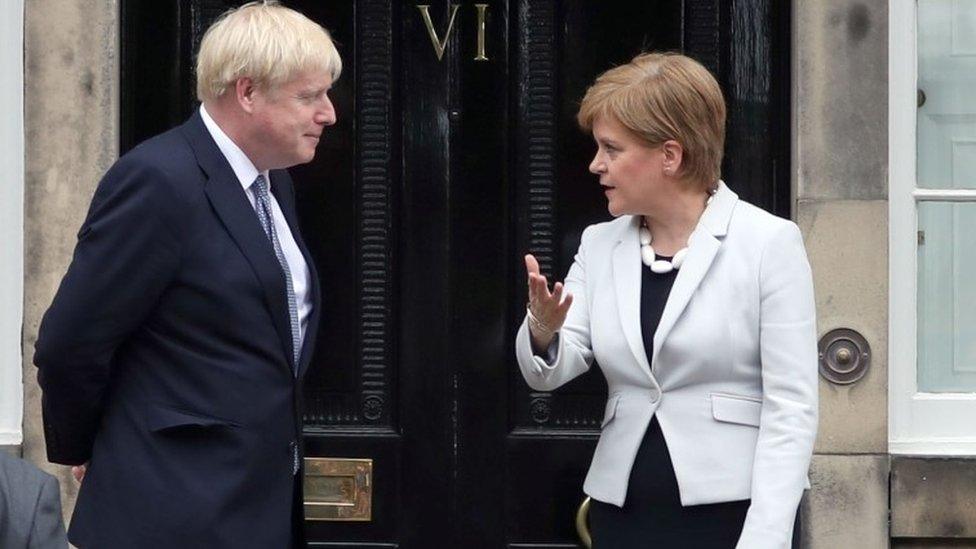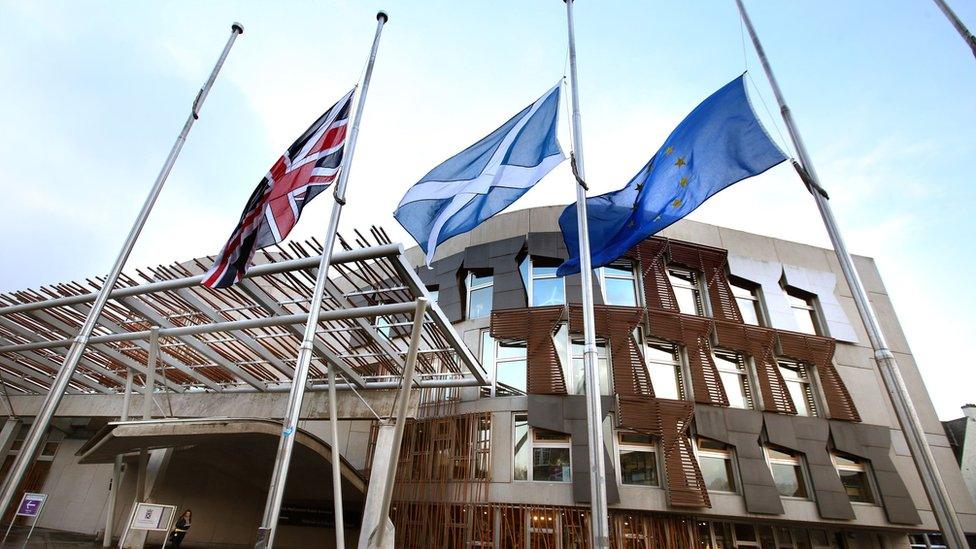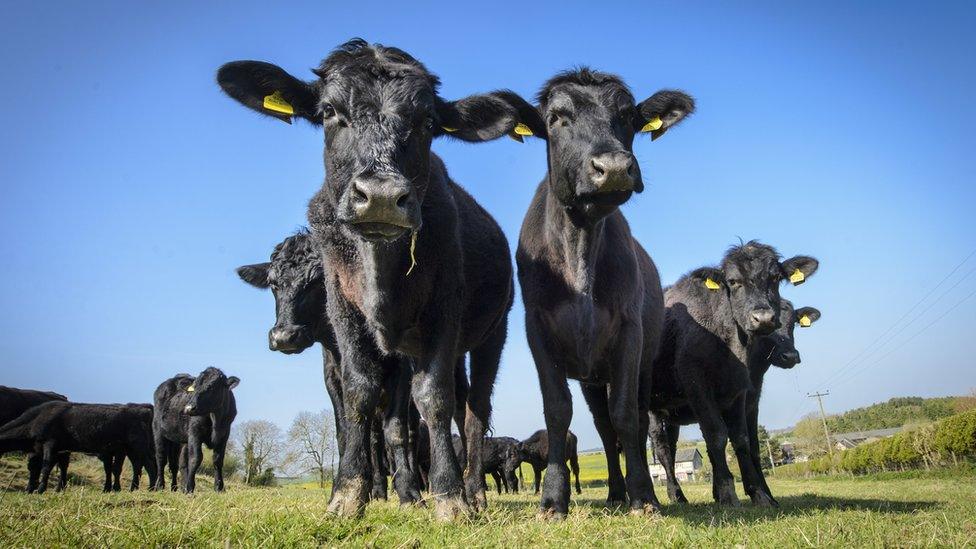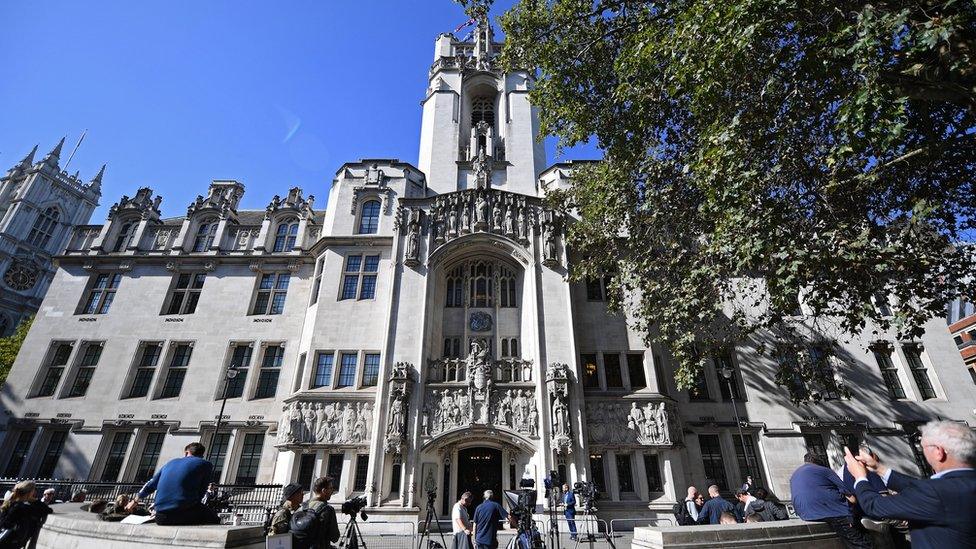What is the row over UK 'internal markets' all about?
- Published
- comments

Boris Johnson and Nicola Sturgeon come from very different positions on Brexit
Whether there is a Brexit deal or not, the Scottish and UK governments are heading into another constitutional standoff after legislation to set up an "internal market" passed through Westminster. What is the latest row all about?

'Power grab' or 'power surge'?
When you mention the UK Internal Market Bill - now an Act, having received Royal assent - the controversy which immediately springs to mind might be that of "breaking international law".
The legislation caused an immediate clash with the EU over provisions which could have rewritten parts of the Brexit withdrawal agreement.
This row has been smoothed out, with UK ministers agreeing to drop the most contentious plans following talks with EU counterparts.
However, the core function of the bill remains controversial for what it might mean for the future of devolution.
Parts of this row might seem somewhat familiar, because it's actually been going on more or less ever since the Brexit vote in June 2016. The question of how powers currently exercised from Brussels are divided up after the transition period ends on 31 December has been already seen the two governments clash at the Supreme Court.
At its most basic level, this is a row about who gets what.
The Scottish government says a Westminster "power grab" is under way, because any responsibility which is not specifically reserved should automatically come to Holyrood.
But the UK government says what is happening in January represents "the biggest transfer of powers in the history of devolution".
You can argue the toss about who is right, but that is perhaps something of a sideshow to the more fundamental conflict - how these powers are used, and what it could mean for the future of regulations and standards in the UK.


Who sets the standard?
For a few more days, the UK is still part of the European single market, with jointly agreed regulations and standards right across the continent.
From January, the UK government wants to continue to have a joint market across England, Scotland, Wales and Northern Ireland - the "internal market".
Instead of the rules and regulations around things like food and air quality and animal welfare being set in Brussels, now they have to be set closer to home - and there is a row over who should have the final say.
Many powers are set to be directly controlled by the Scottish, Welsh and Northern Irish administrations, in fields including food labelling, energy efficiency and support for farmers.
However, the UK government has said the devolved administrations will still have to accept goods and services from all other parts of the UK - even if they have set different standards locally.

Who will have the final say over issues like livestock and animal welfare standards?
This means there would be a level playing field for companies across the "internal market" - so Welsh farmers could sell their lamb in Belfast, Scottish whisky distilleries could buy barley from English farmers, and so on. UK ministers warn that not having this kind of system could cause "serious problems" for trade across the UK.
The flip side of the coin, as the devolved administrations see it, is that all four nations will have to accept goods at the standards set in any one country - sparking fears of local quality controls being dragged down to a lowest common denominator in a "race to the bottom".
The oft-cited example is that if the UK government did a trade deal with the US which allowed the importation of chlorine-washed chicken to England, the new rulebook means it would ultimately have to be allowed in Scotland, Wales and Northern Ireland too. UK ministers insist they would not do such a deal, and want to maintain high standards.
They got the bill through the House of Lords by making some concessions to the effect that some regulatory divergence can be agreed upon via a system of "common frameworks" - rather than being outlawed entirely.
However the devolved administrations are still far from happy, with the Scottish government saying the "small concessions" made do "not go nearly far enough to mitigate the damage the bill will do to devolution".

How might this be resolved?
We have actually seen this row play out once already, and history appears to be repeating itself.
Last time around, the Scottish Parliament refused to give devolved consent to Westminster's EU Withdrawal Act, and passed their own legislation through Holyrood - only to be overruled after a legal showdown at the Supreme Court.
History is already repeating itself. MSPs have once again rejected giving consent to the UK legislation, and the UK government has again gone ahead regardless of the protests from Edinburgh and Cardiff.
The Welsh government is threatening to go to court, and Scottish ministers are enthusiastically backing them - while getting on with their own legislation to "keep pace" with EU directives.

Previous constitutional standoffs have ended up in the Supreme Court - could this go the same way?
The row with the EU was solved after Michael Gove flew to Brussels for talks as part of the wider effort to secure a trade agreement after the transition period ends on 31 December.
However the clash with the devolved administrations is a more fundamental one, and the chances of it being settled amicably appear slim.
To start with, the governments in Edinburgh and London come from fundamentally different places on the question of Brexit.
From a wider political perspective, polling guru Professor Sir John Curtice has identified angst about Brexit among Scottish Remain voters as being central to the recent trend of rising support for Scottish independence.
The two big constitutional issues have become tightly interwoven, and next year's Holyrood election will provide a perfect stage for these rows to play out very publicly.
Nicola Sturgeon has already drawn the link between the three, saying the SNP will be campaigning to demand a new independence referendum as "the only way to protect the Scottish parliament from being undermined and its powers eroded".
The Conservatives meanwhile will undoubtedly be campaigning in May to keep the UK - and its internal market - intact.
The UK may be exiting the transition period on 31 December - deal or no deal - but the rows over Brexit look set to rumble on for some time to come.
Related topics
- Published16 July 2020
